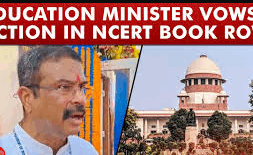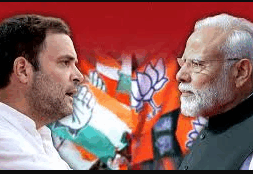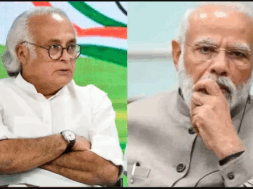
Manas Dasgupta
NEW DELHI, Mar 15: The Supreme Court on Friday came down hard on the State Bank of India for giving incomplete details of the electoral bonds and non-disclosure of the unique alphanumeric numbers of individual electoral bonds to the Election Commission of India (ECI) for publication on its official website.
Hearing an application by the ECI seeking a return of the data on the bonds which was deposited with the Supreme Court registry, a five-judge Constitution bench presided by Chief Justice of India (CJI) D Y Chandrachud noted on Friday that the SBI had not furnished the numbers of the electoral bonds, a scheme that allowed individuals and businesses to donate anonymously to political parties. The court had struck down the scheme and directed the bank to share all details on the donations made in the last 5 years.
The Supreme Court said the data provided by the SBI was incomplete and directed the SBI to disclose electoral bond numbers as well, in addition to the details it has already shared. The electoral bond numbers would help establish the link between donors and political parties.
“Who is appearing for the State Bank of India? They have not disclosed the bond numbers. It has to be disclosed by the State Bank of India,” Chief Justice Chandrachud said right at the outset of the hearing.
“In our judgment of February 15, we had directed disclosure specifically of all the details of the electoral bonds, including date of their purchase, the amount, names of purchasers, the political parties which redeemed the bonds, etc. But the bank has not disclosed the numbers of the bonds purchased and encashed. Why?” CJI Chandrachud asked during a special hearing.
The court issued notice to the bank and listed the case on March 18. The SBI had on Tuesday informed the Supreme Court that it has furnished details of the purchase and redemption of electoral bonds to the ECI in pursuance of the top court’s directions.
Advocate Prashant Bhushan appearing for petitioner NGO Association for Democratic Reforms said the SBI in its application seeking more time had said it has bond numbers et cetera and that the poll bonds data were in two different silos.
Solicitor General Tushar Mehta urged the court to issue notice to the SBI saying they were not party to the proceedings and may have something to say. He clarified that he was not appearing for the bank. “SBI is not a party. They were here because they had moved an application,” he said.
The CJI said, “They should be here when the matter is going on”. Expressing displeasure over the bond numbers not being disclosed, he added, “Really speaking…we can take exception to what they have disclosed because they were duty bound…” The court then referred to its operative directions.
Senior advocate Kapil Sibal appearing for one of the petitioners said, “This is an inclusive order… should include all details.” The bench then proceeded to issue notice to SBI and said in its order, “The judgement of the Constitution bench required the SBI to furnish to the ECI, and all details of the electrical bonds purchased and as the case may be redeemed by political parties, including the date of purchase, name of purchaser and the date of purchase/redemption. It has been submitted that SBI has not disclosed the unique alphanumeric number of the electoral bonds. Solicitor general submits that since he is not appearing for the SBI, notice may be issued to SBI. We direct the registry to issue notice to SBI, returnable on Monday.”
Electoral bonds allowed individuals and businesses to donate money to political parties without declaring it. They were introduced by the BJP government in 2018 as an alternative to cash donations and had been pitched as an initiative to bring transparency in political funding.
But the Supreme Court struck down the scheme last month, terming it unconstitutional and over concerns that this could lead to a quid pro quo. The court also urged SBI to share all details about the purchase and redemption of the bonds with the Election Commission.
The Bench further agreed to return to the ECI documents regarding electoral bonds it had given the court on two past occasions in compliance with judicial orders passed on April 12, 2019 and November 2, 2023. The ECI had given these documents to the court in sealed envelopes and boxes.
On February 15, the five-judge Bench, in its judgment, had directed the ECI to publish, along with the details of electoral bonds in its possession, the confidential information passed on to the court.
However, the ECI had filed an application on March 14 saying that it had given the court the originals of the documents and not retained any copies. The ECI said it had handed over to the Supreme Court a sealed cover, which contained 106 sealed envelopes, and then sealed boxes containing a total of 523 sealed envelopes in two tranches in pursuance of the judicial orders of April 2019 and November 2023.
“We presumed you would have retained copies,” Chief Justice Chandrachud addressed advocate Amit Sharma, appearing for the ECI. The court ordered its Registry to scan and digitise the copies of the documents in the course of the day and finish the work by Saturday. The originals would be returned to the ECI along with a digitised copy.
The ready availability of the digitised copy of the documents, that too taken by the Supreme Court itself, would help avert any delay in the publication of these records regarding the electoral bonds.
The court, in its February 15 judgment, had required the SBI to provide the ECI with the complete details, including dates of purchase; the names of the purchasers; the denominations of the bonds purchased along with the details of bonds redeemed by political parties, including the dates of encashment and denominations of the electoral bonds. The SBI had said a total of 22,217 electoral bonds were purchased and 22,030 were redeemed by political parties between April 1, 2019 and February 15, 2024.














